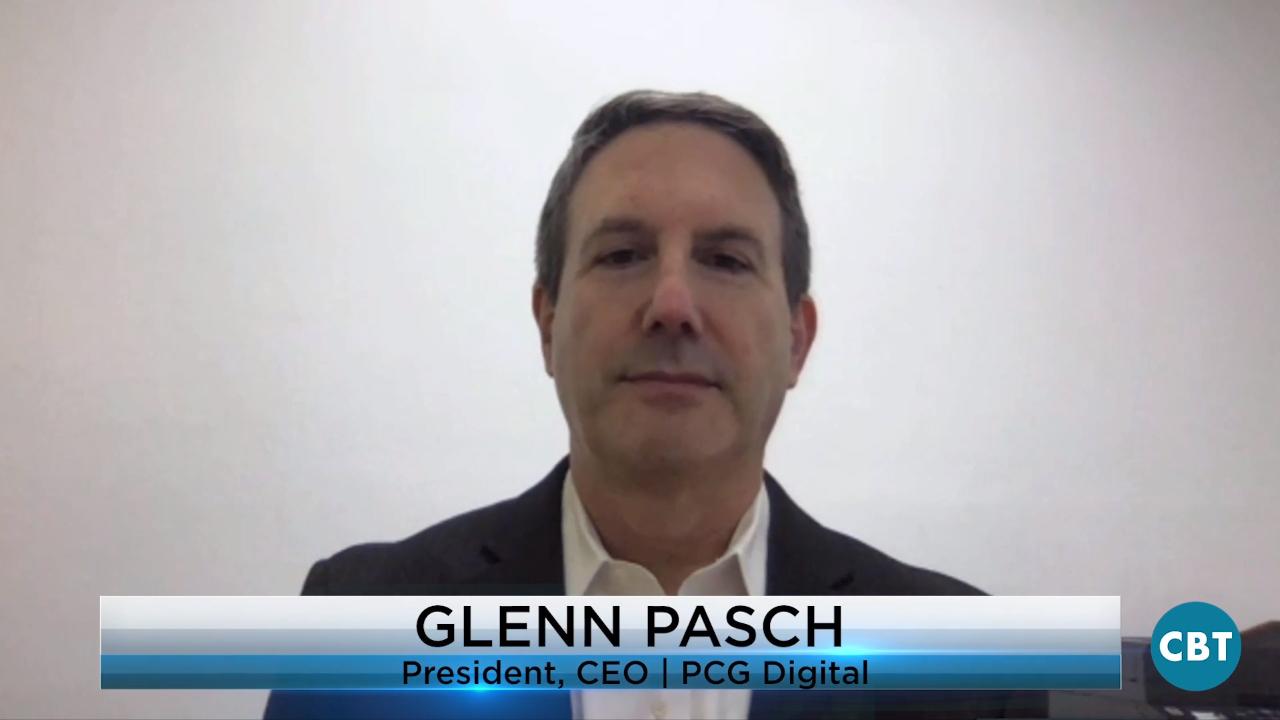Jim recently caught up with Glenn Pasch, auto marketing expert, and CEO of PCG Digital. They discussed the importance of re-evaluating your dealership’s marketing team and spend. They tackle questions like ‘who should make up the marketing team?’ and ‘what should I try to accomplish with every campaign?’. You won’t want to miss this interview.
Jim Fitzpatrick: We are so excited to have with us today Mr. Glenn Pasch who is President and CEO of PCG Digital. I know you know that name. They’ve been around for umpteen years in the automotive space helping hundreds of dealers with figuring out their digital marketing plans and strategies and doing a heck of a job at it.
Jim Fitzpatrick: Welcome back to the show, Glenn.
Glenn Pasch: Thanks for having me. I’m glad to be back.
Jim Fitzpatrick: Sure. You wrote a blog recently, and we wanted to talk to you about it. It was titled “Rethinking Your Marketing Team.” Talk to us about that.
Glenn Pasch: When I’m out with a lot of dealerships, and I’m working with them, and we get talking about marketing. It always seems this disconnect of “Well, it’s the agency. Those people over there,” or even if they have a marketing manager internally, they’re usually, “They’re over there in the back,” and it’s really disconnected from the day to day of what you’re doing.
What I started thinking about was who should really be marketing the dealership, and it came to me saying, “Well, everybody in some way or form or fashion is marketing.” The way you answer the phone is marketing. What emails your sending to someone is marketing. How you greet them, marketing. How the store looks. It’s all reinforcing the message, because if I’m out there, as I always say, as an agency, I can drive traffic. I can get people to come, but if you’re telling me that you take care of people, but you won’t answer the phone, you’re not really reinforcing the marketing, or even being conscious that, that’s marketing to your consumer about how you’re gonna take care of it.
Jim Fitzpatrick: What you’re suggesting is that to bring everyone in the fold? Right? That’s consumer-facing in the dealership, and let them know they’re part of the marketing team. Right?
Glenn Pasch: Absolutely. Absolutely. It’s surprising to me how many times campaigns will be running, and I’ll ask the sales people. “Well what are your sales? How is this event going,” and they’re going “What event? I don’t even know what’s going on.” That’s number one let alone, as you said the forward facing people. A lot of times it’s pretty good face to face as people come. Where I see a lot of it is through their email communications. There’s misspellings. There’s broken links. There’s no consistency in the formatting, and I’m going, “Well, that’s part of your branding. That’s part of your messaging. That’s part of that concept of “I’m marketing how great we are through my actions,” but a lot of people don’t think that way.
Jim Fitzpatrick: Right. Right, and that is a problem, because nowadays it’s all about how you’re communicating with the prospect before they even get to the dealership, right?
Glenn Pasch: Sure, and I came from hospitality years ago, so we take it for granted when we go to hotels, or if we’re in restaurants. We judge how the people are producing and interacting with us, and making our experience great. We’re judging how the food tastes versus what they marketed to us how it would be.
Very similar in automotive dealerships, they have a lot of similarities to hospitality to restaurants, hotels, where’s there’s constantly people coming in, different things happen every day. I think a dealer should look at every single touch point where a customer can interact, and look at what they’re doing through the lens of marketing what we do, versus just “Hey, I gotta leave a message.”
Jim Fitzpatrick: Right. Right. If a dealership has employees that are not actively engaging in the marketing strategy. How do you get those employees on board? Is it a matter or training, or a matter of just recruiting the right people.
Glenn Pasch: Probably D. All of the above. If you create a process, right. Let’s look at say, how people are following up with internet customers online. Well, you build a process to look at those templates and those emails and say, “These are the emails we used. Here is the structure of how we do it. They always have this logo. They always have this email signature, and it doesn’t change.
You can say, “Here’s how we answer the phone.” You can then also hire people who are more adept at sharing your social media posts, who are engaging, or just have a better personality, and are aware of looking around every moment in the dealership to notice there’s something on the floor, or notice that someone’s desk is mess, or notice that the cars a little dirty, or things of that nature, and they just respond to say, “I have to go straighten that up, versus, “Well that’s somebody else’s job.”
Jim Fitzpatrick: What should dealers be trying to accomplish with each marketing campaign, and what should they be spending on these things?
Glenn Pasch: Great question. Each marketing campaign, you always have to ask your agency partner, or your marketing team, what are we trying to accomplish? That’s the first thing, because if I’m using social media, and I’m using a Facebook ad, and I just want to let the area know that we are now open on Sunday for service. Let’s say you opened up on Sunday for service. You’re usually closed from 9-12. Well I just want an awareness ad going out. Maybe I have a video. The point is then not to necessarily schedule. That’s a byproduct, but I want as many people to see it. Maybe that’s impressions. Maybe it’s video views where a different campaign that I’m running, I want them to go to a landing page. I want them to click through, and leave their name, or I want them to call. Right?
Everything is a little different based on that, and more and more they should be targeted to people not just priced to an area. I should be looking at all of my vehicles to say, “Who buys that?” Create a campaign for that person. Right? The second part of your question is spend as much as you can afford that still generates results. Right? There is a tipping point where you can spend too much, and you’re just spending for the sake of spending.
Whatever, you should first trust your agency partner to guide you in the right direction with a price, but always ask, “Well then, what should I be able to see from this,” and then let it run for maybe a couple months, because stop judging everything on one month. There is no lead faucet under my desk that I just turn on and turn off. Right? You gotta give it some time, but every month you’re asking what did we get in terms of whatever the objective of those campaigns. Did we meet those objectives.
Jim Fitzpatrick: You’re asking for the dealers that are watching the managers. You’re asking for an eternity when you say three months right, because every manager out there says, “Well what did we do this weekend? What’d we do this month? How are we gonna finish this month, and man if we don’t hit our numbers this month, you can be sure in the conference room the following the Monday, when the new month starts, things are gonna change. We’re gonna redo everything. What we did last month didn’t seem to work.” Big mistake, right?
Glenn Pasch: Yeah, I think there’s two-fold with that. I think there are short term and long term strategies. I think you have to have to have marketing campaigns that run for 90-120 days, but again it’s what are we trying to accomplish with those? Others might be more, “Hey, there’s a sale this weekend.” The problem is that being automotive, there’s always a sale.
There’s multiple sales, and they sort of wear out their focus, but if you pivot it around to say, “I’m gonna create a campaign focused on graduates,” and I picked the car that a high school or college graduate should or does buy, and create a campaign and run that for the month before graduation. Okay. That’s better. Then we can see that, but if we don’t let marketing run, and you keep changing everything, cutting budget, moving vendor, all you’re doing is delaying any type of results.
It is very hard. I get it. Manufacturers put pressure on everybody, 30 day cycle, but very few other industries run on this 30 day cycle with marketing focus. Sales, okay, but you can’t like I said, you can’t expect, “We didn’t sell. I’m gonna cut my budget down,” but then you’re not gonna get opportunities next month. Oh okay. Well, here’s your money back, but it didn’t happen right away. It just doesn’t work that way.
Jim Fitzpatrick: Right. Marketing doesn’t work overnight. I don’t care what it is, right?
Glenn Pasch: No.
Jim Fitzpatrick: Sometimes, it doesn’t really take full effect until maybe the second or third month, right?
Glenn Pasch: Well, especially when you’re doing things now with social media, because let’s say you use Facebook. Facebook is learning what audience they should be showing your ad to. It takes times for the algorithms to understand that.
Jim Fitzpatrick: Good point.
Glenn Pasch: If you think of the most successful campaigns out that we all remember through whatever. If I asked you, what was one of the commercials that you just always remember? What would you say? One commercial that stuck in your head. What would it be?
Jim Fitzpatrick: Peanut M&M’s. I love those guys.
Glenn Pasch: Okay. Guess what? They’re on TV year after year, after year, Right? You could sit there and go back when we were younger, “Where is the beef?” Right? Guess what? It was on TV long, so a lot of time each day, so it stuck in your head.
That’s what dealers have to remember is that just turning on something two days before you want it to happen, it’s not gonna stick in people’s head, especially in the clutter of the internet where everybody’s doing advertising.
Jim Fitzpatrick: I see. Exactly right. Glenn Pasch, CEO of PCG digital, thank you so much for joining us once again on CBT news. We very much appreciate it.
Glenn Pasch: My pleasure. Anytime. Have a great day.
Jim Fitzpatrick: Thanks so much.
Thank you for watching the official news source of the retail automotive industry. This has been a JBF Business Media production.









